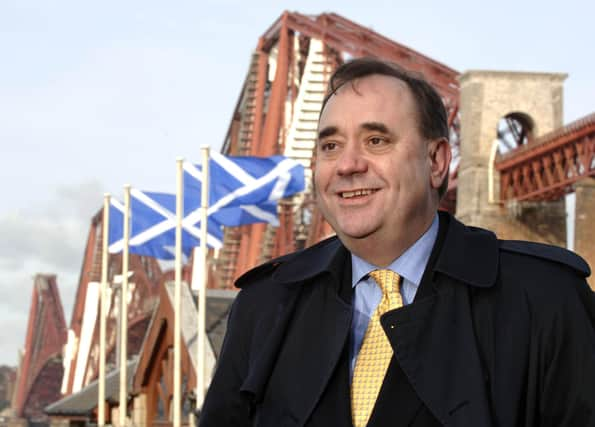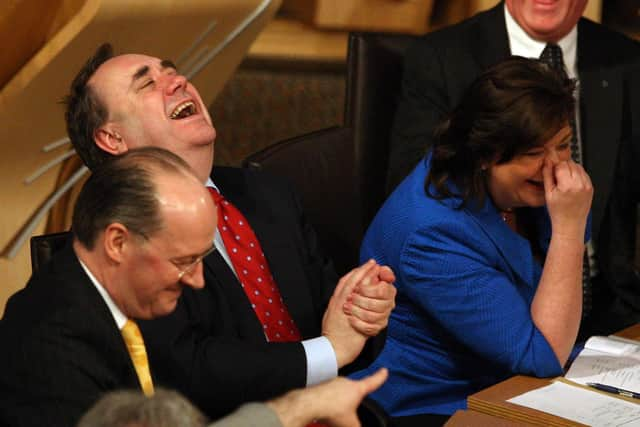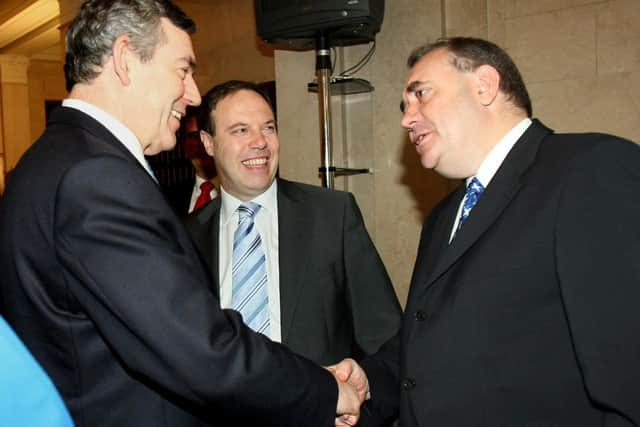Alex Salmond: A brief history of his career


Alex Salmond began his rise to power with an early start in politics, standing as the SNP candidate in mock elections at Linlithgow Primary School and winning a landslide victory by offering half-days for all pupils and promising to replace school milk with ice cream.He would eventually go on to lead the SNP into government for the first time and become Scotland’s longest-serving First Minister.
He transformed his party, taking it from the fringes of Scottish politics to the centre of power, ousting Labour from its traditional dominance and coming close to realising the Nationalists’ dream of independence.Born the son of two civil servants on Hogmanay 1954, he attended Linlithgow Academy, where he was nicknamed "Fish" and then studied at Edinburgh College of Commerce from 1972-3, gaining an HNC in Business Studies, before going on to St Andrews University, where he graduated with a degree in economics and history.
Advertisement
Hide AdAdvertisement
Hide AdIt was while he was at St Andrews that he joined the SNP after an argument with an English girlfriend.


University friends also recall him sometimes staying up all night playing Diplomacy, a board game which requires strategy and negotiation as well as bluff and backstabbing - a good training for any politician.
After university, he wanted to become a TV reporter, applying for a job with the BBC and making it a good way through the process and reportedly being devastated when he didn’t quite make it. It is also said he considered becoming a Church of Scotland minister.
But instead he followed his parents, Robert and Mary, into the civil service, going to work in 1978 as an assistant economist in the Department of Agriculture and Fisheries for Scotland, part of the then Scottish Office. There he met fellow civil servant Moira McGlashan, 17 years his senior, and the couple were married in 1981.
Mr Salmond soon moved on to the Royal Bank of Scotland where he worked for seven years, including five years as oil economist.


Meanwhile, his activity in the SNP was growing. He started his political life as a committed left-winger and was a leading member of the socialist 79 Group inside the SNP. Along with other key figures in the group, he was briefly suspended from the party in 1982. But the episode did not impede his political rise and he was elected to parliament as MP for the Banff and Buchan constituency in 1987.
At that time he was one of just three SNP MPs at Westminster, but he was determined to make his mark and the following year he grabbed headlines by interrupting Conservative chancellor Nigel Lawson's Budget speech to protest about tax cuts for the rich while the Government pressed ahead with the poll tax.
Leader of SNP
And in 1990, he was elected leader of the SNP after a contest with Margaret Ewing, daughter-in-law of Nationalist icon Winnie Ewing.


Advertisement
Hide AdAdvertisement
Hide AdHe brought a new dynamism to the party and at the 1992 general election it increased its vote by 50 per cent, though failed to win any more seats.When Tony Blair became prime minister in 1997 and brought forward legislation to create a Scottish Parliament, Mr Salmond campaigned alongside Labour and the Liberal Democrats to bring about devolution, which he saw as a stepping stone to independence.
But the SNP's performance in the first Scottish Parliament elections in 1999 - winning just 35 seats to Labour's 56 - was seen as disappointing and the following year he quit as leader, standing down as an MSP in 2001 to concentrate on his role as an MP at Westminster.
When his successor, John Swinney, resigned in 2004, Mr Salmond ruled out a return but then changed his mind and announced he would stand with Nicola Sturgeon as his running mate and won 75 per cent of the votes, becoming leader for the second time.
He returned to Holyrood as MSP for Gordon in the 2007 elections and led the SNP into government for the first time. The party had won just one seat more than Labour and formed a minority administration which survived against the odds for its full term with remarkably few defeats.
In the 2011 Holyrood election Mr Salmond led the SNP to a storming victory, winning an unprecedented overall majority in the Scottish Parliament and paving the way for the 2014 independence referendum.
As voting day neared, opinion polls showed the Yes campaign edging ahead, but in the end the result was 55-45 against independence. Mr Salmond announced his resignation the next day. He said 20 years leading the SNP was "not an unreasonable shift at the coal face".
Handing over the reins to Nicola Sturgeon, he turned his attention to Westminster again, getting elected MP for Gordon at the 2015 general election serving as the party's foreign affairs spokesman.
Hosting RT channel
But two years later, in Theresa May’s snap general election of 2017, he lost the seat to the Tories - his first defeat as a candidate in any parliamentary election and the first time he found himself out of elected office for 30 years,
Advertisement
Hide AdAdvertisement
Hide AdMr Salmond decided to make the best of it by taking to the Edinburgh Festival Fringe with his own show, billed as a mix of comedy, music, political reminiscence and chats with guests.
And he followed that with the launch of a new career on television, hosting The Alex Salmond Show on the RT channel, formerly Russia Today. Politicians from other parties accused him of a lack of judgement and Nicola
Sturgeon said she would have advised against joining the channel.
In August 2018, it was revealed Mr Salmond had been reported to the police over sexual assault allegations after two staff members complained about his behaviour dating back to his time as First Minister.
He launched a crowdfunding appeal to fund the legal costs of seeking a judicial review challenging the way the Scottish Government had handled the allegations. It attracted donations totalling £100,000 in just two days.
And in January 2019 he won his case after the Scottish Government admitted it had botched its internal investigation into the claims.
But later the same month Mr Salmond attended Dalkeith police station, where he was arrested and charged with a total of 14 offences involving ten women.